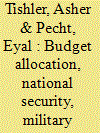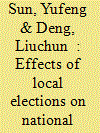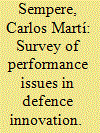|
|
|
Sort Order |
|
|
|
Items / Page
|
|
|
|
|
|
|
| Srl | Item |
| 1 |
ID:
153068


|
|
|
|
|
| Summary/Abstract |
This study develops a dynamic model that integrates military intelligence into the defense capability of the country and the optimal allocation of its government budget. We assert that the effectiveness of the country’s military intelligence is contingent on the quality of its human capital, which, in turn, implies a long-term positive relationship between the government’s various civilian expenditures and its capacity to achieve a cost-effective intelligence and, hence, military capability. This relationship is developed within a multiple-period arms race model between two rivals. Using this model and stylized data for the Israeli–Syrian arms race, we show that an appropriate budget shift from defense to civilian expenditures during the initial periods of the planning horizon will gradually (over a decade, say) increase the quality of human capital in the country and, thus, the effectiveness of its intelligence, which, in turn, will increase the country’s future security and welfare.
|
|
|
|
|
|
|
|
|
|
|
|
|
|
|
|
| 2 |
ID:
153063


|
|
|
|
|
| Summary/Abstract |
The Portuguese economist Carlos Pestana Barros died on 19 February 2017. He was 63 years old. Carlos spent his career as a researcher and teacher at ISEG of University of Lisbon. Carlos was an indefatigable academic that actively promoted academic cooperation. He organized conferences and journal special issues contributing to the field by networking authors, disseminating new models, data, and empirical methods. He was a member of the Editorial Board of Defence and Peace Economics and of several other journals.
|
|
|
|
|
|
|
|
|
|
|
|
|
|
|
|
| 3 |
ID:
153065


|
|
|
|
|
| Summary/Abstract |
In this paper, we study the domestic political determinants of military spending. Our conceptual framework suggests that power distribution over local and central governments influences the government provision of national public goods, in our context, military expenditure. Drawing on a large cross-country panel, we demonstrate that having local elections will decrease a country’s military expenditure markedly, controlling for other political and economic variables. According to our preferred estimates, a country’s military expenditure is on average 20% lower if its state government officials are locally elected, which is consistent with our theoretical prediction.
|
|
|
|
|
|
|
|
|
|
|
|
|
|
|
|
| 4 |
ID:
153067


|
|
|
|
|
| Summary/Abstract |
When the US Air Force set out to acquire a new aerial tanker (the KC-X), two highly suitable alternatives were offered. What could have been a short and simple source selection turned into a prolonged embarrassment. The original selection of 100 leased KC-767s was made in May 2003. But the KC-46 is expected to be operational in 2017 – more than a decade later. Our primary purpose here is to narrate and explain key events in the KC-X program. We search for useful paradigms, based in part on the US Government being better viewed as a quarrelsome committee than a monopsonist. In addition, we consider what this case might tell us about the US defense acquisition system.
|
|
|
|
|
|
|
|
|
|
|
|
|
|
|
|
| 5 |
ID:
153064


|
|
|
|
|
| Summary/Abstract |
Arms transfers provide exporters an avenue to provide security to other states while gaining economic benefits. Arms transfers provide importers an avenue to gain security without having to rely on alliances. Past research uses aggregate measures of the monetary or security value of major weapon system transfers without accounting for strategic differences in possible use in interstate and civil conflict. This article presents a data set on interstate transfers of major weapon systems between 1950 and 2010 building upon Stockholm Peach Research Institute’s Arms Trade Register with several improvements. First, it disaggregates land weapons and air weapons into categories reflecting their strategic capabilities. Second, model level characteristics (e.g. age, speed, and range) are drawn from Jane’s Defence sources. Additionally, the data set covers a larger range of time and states than previous data sets categorizing arms. To demonstrate the usefulness, this article first presents summary statistics of the data set and then replicates an earlier test to show that the effect of human rights and regime types on United States transfers differs across the categories of arms compared to alternative measures of arms transfers.
|
|
|
|
|
|
|
|
|
|
|
|
|
|
|
|
| 6 |
ID:
153066


|
|
|
|
|
| Summary/Abstract |
This article reviews innovation processes in defence. It analyses the way and the context under which these processes are carried out. The article covers the features of defence goods with impact on innovation, the development of a new good, the institutional arrangements that support these processes and the effect of innovation on industrial market. The analysis helps to identify the causes of facts observed in practice, such as poor performance in terms of product quality, cost or delivery time, as well as to assess potential remedies. Some policy implications, which can be derived from this analysis, are finally outlined.
|
|
|
|
|
|
|
|
|
|
|
|
|
|
|
|
|
|
|
|
|